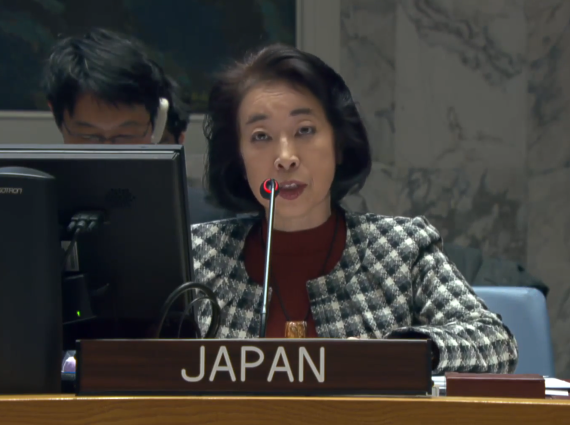ソマリア情勢に関する安保理会合における志野大使ステートメント
令和6年2月19日

I thank SRSG Catriona Laing and SRCC El-Amine Souef for their informative briefings. I also would like to welcome the presence of the representative of Somalia.
Last month, ATMIS and the Somali Security Forces achieved another milestone by completing the second phase of the ATMIS drawdown. We commend the firm commitment of the Federal Government of Somalia (FGS) to the security transition plan. We pay tribute to all the personnel of ATMIS and Somali Security Forces for their sacrifice to build peace and stability in the region.
The Somali Security Sector Development Plan, presented last December, rightly focuses on stabilization efforts for newly liberated territories in addition to offensive operations against Al-Shabaab. It is of the utmost importance to accelerate Security Sector Reform for ensuring sufficient presence of Somali security forces to achieve a smooth transition. To this end, Japan decided last November to contribute approximately 1.8 million USD to support the Somali Police for its operations in the fragile and newly recovered areas in partnership with UNDP.
We also welcome the Somali governments’ efforts to establish a clear legal framework for law enforcement and security functions. The rule of law cannot be achieved in a security vacuum and security cannot be maintained without the rule of law. Institution building of effective and accountable police constitutes a vital part of ongoing stabilization efforts.
The support from the neighboring ATMIS Troop Contributing Countries to Somali force generation also continues to be essential for the success of the security transition. Any regional tensions increase risk of losing hard-gained achievements, and thus must be avoided through constructive dialogues among stakeholders.
Madam President,
Combatting Al-Shabaab requires a whole-of-society approach over the long run based on the Humanitarian-Development-Peace nexus in line with the WPS and YPS perspectives. Somali society needs to increase its overall resilience to prevent any intrusion by Al-Shabaab into areas of weakness. To that end, basic services should be accessible for all under the state’s authority. Reaching the completion point of the Heavily Indebted Poor Countries (HIPC) initiative is a significant outcome of the FGS’s efforts, and that momentum should be well utilized for economic and financial reforms with additional credit from international financial institutions.
The devastating impact of the heavy rain in the last quarter of 2023 clearly illustrated the vulnerability of Somalia to severe climate shocks. Tens of thousands of people have been facing a dire humanitarian situation due to the devastating impacts of the floods. Socio-economic development with continued assistance from the international community is much needed for the betterment of people’s welfare. Japan decided this month to provide emergency grant aid to Somalia in partnership with UNHCR, IOM and UNICEF for shelters, water and sanitation, Non-Food Items (NFIs) and Health.
A successful transition in Somalia is vital for peace and stability in the entire region. We note the discussion in the AU about the post-ATMIS security configuration and look forward to participating in future deliberation on possible UN engagement. Japan remains committed to contribute together with all our partners to collective efforts towards that goal.
I thank you.
